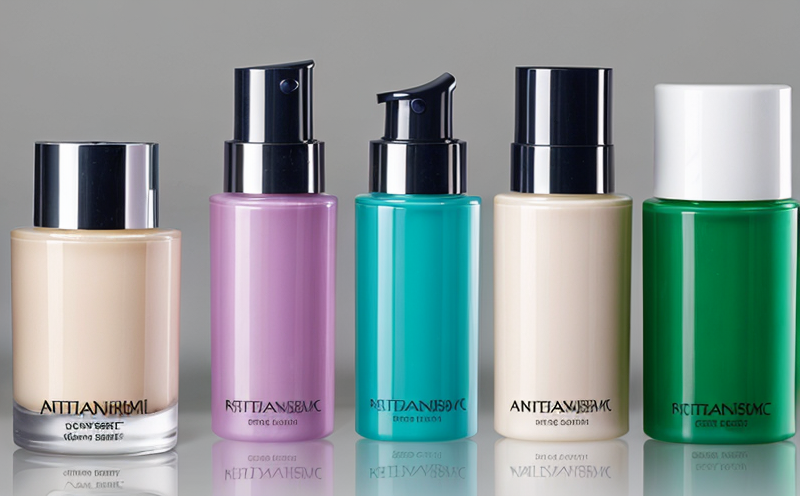Antimicrobial Preservation Testing in Sunscreen Sprays
In the realm of cosmetic product development and quality assurance, ensuring that a sunscreen spray effectively maintains its efficacy over time is paramount. Antimicrobial preservation testing plays a critical role in this process by simulating real-world conditions to assess the performance of preservatives and antimicrobial agents within these products.
Preservatives and antimicrobials are essential components used to inhibit the growth of microorganisms such as bacteria, yeast, and mold that can lead to spoilage or degradation of cosmetic formulations. In sunscreen sprays, which often contain water-based ingredients, these contaminants can thrive, potentially compromising product safety and shelf life. Therefore, rigorous testing is indispensable.
The process involves exposing the sample to various stressors such as temperature extremes (both high and low), humidity levels, and storage conditions that mimic real-world scenarios. The efficacy of preservatives is then evaluated by measuring microbial growth or survival rates after exposure to these conditions.
Testing standards like ISO 22196:2011 provide guidelines for evaluating the antimicrobial activity of cosmetic products. This includes methods for determining minimum inhibitory concentrations (MICs), which are crucial in understanding how effective a preservative is at preventing microbial growth.
Real-world applications underscore the importance of this testing. For instance, a company developing a new sunscreen spray must ensure that it remains stable and safe throughout its shelf life under typical storage conditions. By conducting antimicrobial preservation tests, manufacturers can identify any potential weaknesses in their formulations early on, allowing for necessary adjustments to be made before product launch.
Understanding the nuances of this testing also helps regulatory compliance officers stay abreast of changing industry standards and requirements. Compliance with regulations such as those set forth by the European Union's Cosmetics Regulation (EC 1223/2009) ensures that products meet stringent safety and efficacy criteria, thereby protecting consumers.
For R&D engineers involved in product development, antimicrobial preservation testing provides valuable insights into formulation stability and potential improvements. This information can guide further research efforts aimed at enhancing the performance of existing preservatives or developing new ones tailored specifically for sunscreen sprays.
Scope and Methodology
The scope of antimicrobial preservation testing in sunscreen sprays encompasses a range of methodologies designed to assess the effectiveness of preservatives against common microorganisms found in cosmetic products. This includes both quantitative assessments (such as counting colony-forming units) and qualitative evaluations (observing visual changes).
- Quantitative Assay: Using techniques like agar dilution, MICs are determined by testing different concentrations of preservative until growth is inhibited.
- Qualitative Assessment: Observing signs of microbial activity such as turbidity or color change in the sample over time.
The methodology typically involves preparing test samples under controlled conditions that simulate typical storage environments. Samples are then exposed to various stressors, including temperature fluctuations and humidity variations, which mimic real-world exposure scenarios. After an incubation period, microbial counts are taken to determine if there has been any growth or survival.
It is important to note that the choice of microorganisms used in these tests should reflect those most likely encountered during product use. Common organisms include Bacillus subtilis, Escherichia coli, and Candida albicans. These tests help ensure that preservatives are effective against a broad spectrum of potential contaminants.
The results from these tests provide critical data for quality managers to make informed decisions about product formulation adjustments, packaging modifications, or additional testing needs. Compliance officers can use this information to ensure ongoing adherence to regulatory guidelines and consumer safety standards.
Industry Applications
| Application | Description |
|---|---|
| Product Development | Evaluating the stability of new sunscreen spray formulations under various stress conditions. |
| Formulation Optimization | Identifying optimal levels and types of preservatives to enhance product shelf life. |
| Regulatory Compliance | Demonstrating adherence to international standards for cosmetic product safety. |
| Packaging Design | Evaluating the impact of different packaging materials on preservative efficacy. |
| Supplier Evaluation | Assessing the quality and consistency of raw materials used in sunscreen sprays. |
| R&D Innovation | Exploring novel antimicrobial technologies for enhanced product safety and effectiveness. |
| Consumer Safety Assurance | Ensuring that preservatives do not pose health risks to consumers even under prolonged exposure. |
The applications of antimicrobial preservation testing extend beyond mere compliance. They play a vital role in ensuring the longevity and safety of sunscreen sprays, contributing significantly to consumer trust and satisfaction. By leveraging these tests, manufacturers can not only meet regulatory requirements but also innovate and improve their products.
Why Choose This Test
- Evaluation of preservative efficacy under realistic environmental conditions.
- Identification of potential weaknesses in product formulations early in the development process.
- Compliance with international standards such as ISO 22196:2011 for cosmetic products.
- Support for regulatory submissions and documentation requirements.
- Potential for product differentiation by demonstrating superior preservation capabilities.
- Enhancement of brand reputation through consistent adherence to safety and quality benchmarks.
- Cost savings by avoiding post-launch recalls due to microbiological issues.
The importance of antimicrobial preservation testing in sunscreen sprays cannot be overstated. It ensures that products remain effective, safe, and reliable throughout their shelf life, ultimately benefiting both consumers and manufacturers alike.





